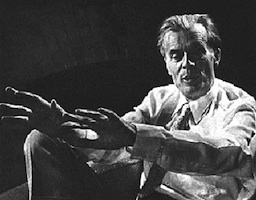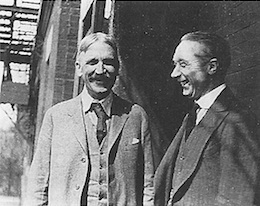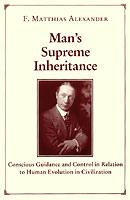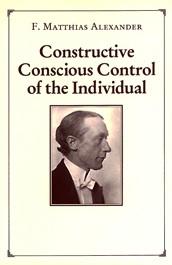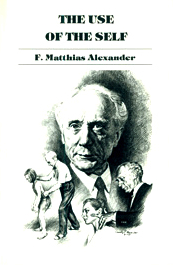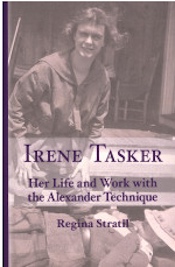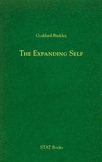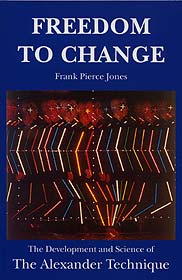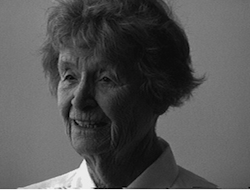

Aldous Huxley |
| Photo © 2010 The Society of Teachers of the Alexander Technique, London |
| John Dewey (left) with F. M. Alexander |
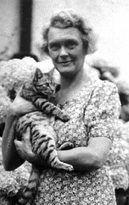 |
Irene Tasker |
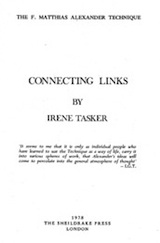 |
Walter Carrington |
F. Matthias Alexander's Books
“Some books are to be tasted, others to be swallowed, and some few to be chewed and digested: that is, some books are to be read only in parts, others to be read, but not curiously, and some few to be read wholly, and with diligence and attention.”
~Sir Francis Bacon
The Four Books by F. Matthias Alexander
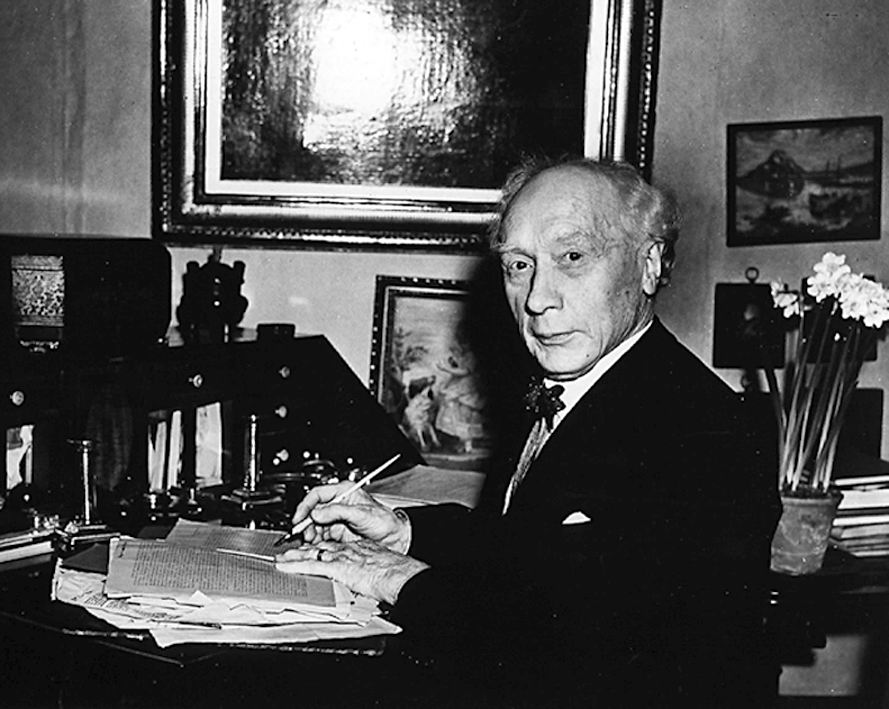 |
Photo © 2014 The Society of Teachers of the Alexander Technique, London |
F. M. Alexander at his writing desk.
|
Man's Supreme Inheritance, 1910, 1918. F. Matthias Alexander's first book and the first book about the Alexander Technique. Includes an introduction by American educator and philosopher John Dewey. Mouritz 1996. ISBN-978-0952557401. Available from Mouritz. Review
Constructive Conscious Control
of the Individual, 1923. Considered by F. M. Alexander himself and many others to be his best book. With an introduction by American educational philosopher John Dewey. 1923, 1946, Mouritiz edition 2004 (recommended). ISBN 0-9543522-6-2. Available from Mouritz. Free audio book download from LibriVox.
The Use of the Self, 1932. This is generally considered to be the “easiest to read” of F. M. Alexander’s four books. (It’s also the shortest.) It includes Alexander's account of his development of the Technique. With an introduction by American philosopher and educator John Dewey. 1932 ISBN-10: 0752843915, ISBN-13: 978-0752843919. Available from Amazon.
The Universal Constant in Living, 1941. This hardback edition contains a wealth of explanatory background information in the editor's notes. Also included are a number of photos, an appreciation by scientist George E. Coghill, and sixteen appendices about the Alexander Technique by various authors, including Aldous Huxley. London: Mouritz, 2000. ISBN-978-0952557449. Available from Mouritz.
More Writings by F. Matthias Alexander
Articles and Lectures. Articles, Published Letters, and Lectures on the F. M. Alexander Technique, 1894 -1950. Covering a time span of 56 years, these articles, letters, and lectures by F. Matthias Alexander, along with the wealth of background information in the editor's notes and introductions to each piece in the hardback edition, provide a history of the origins and development of Alexander's thinking and technique. Mouritz 2022. ISBN-978-3903416055. Available from Mouritz.
Commentaries and Anecdotes about F. Matthias Alexander's Books
From Aldous Huxley
The Saturday Review of Literature, 25 October 1941.
“End-Gaining and Means Whereby”
Writer Aldous Huxley began having lessons with F. M. Alexander in 1935 and continued to have Alexander Technique lessons until at least as late as 1960. The Alexander Technique inspired his book, Ends and Means. Huxley referred to the Technique in a number of his other published writings.
“To those who are interested in the possibilities of a new and more effective education, I heartily recommend this latest and, in many ways, most enlightening of Mr. Alexander's books. In The Universal Constant in Living they will find, along with a mass of interesting facts, the ripest wisdom of a man who, setting out fifty years ago to discover a method for restoring his lost voice, has come, by the oldest of indirect roads, to be a quite uniquely important, because uniquely practical, philosopher, educator, and physiologist.”
From John Dewey
Introduction to Man's Supreme Inheritance (1918) by F. Matthias Alexander
The American philosopher and educator John Dewey (1859-1952) first met F. Matthias Alexander at the time of the first World War and was deeply impressed by the practical benefits and scientific soundness of his teaching. Dewey took private lessons in the Alexander Technique over a 35-year period and wrote the introductions to three of Alexander's books. In his published writings and personal correspondence, Dewey refers to his indebtedness to F.M. Alexander and the Alexander Technique not only for the improvement in his health but also for philosophical insights—the “concrete” form of certain of his ideas.
“The substitution of control by intelligence for control by external authority, not the negative principle of no control or the spasmodic principle of control by emotional gusts, is the only basis upon which reformed education can build. To come into possession of intelligence is the sole human title to freedom. The spontaneity of childhood is a delightful and precious thing, but in its original naive form it is bound to disappear. Emotions become sophisticated unless they become enlightened, and the manifestation of sophisticated emotion is in no sense genuine self-expression. True spontaneity is henceforth not a birthright, but the last term, the consummated conquest, of an art—the art of conscious control to the mastery of which Mr. Alexander's book so convincingly invites us.”
From Irene Tasker
“Connecting Links” 1967
An informal talk given to teachers of the Alexander Technique at the Constructive Teaching Center, London.
The following are excerpts from “Connecting Links,” a 1967 talk given by Irene Tasker, one of the very first teachers of the Alexander Technique. One of the first woman graduates of Cambridge, she was also one of England's first Montessori teachers, having trained with Maria Montessori in Italy. Irene Tasker began teaching the Alexander Technique in 1917. She was the developer of Alexander Technique “application work.” A biography of Irene Tasker was published in 2020.
“After reading Conscious Control [a small book by F.M. Alexander that was later incorporated into the 1918 edition of Man's Supreme Inheritance] I [Irene Tasker] knew that I must learn how to become more ‘conscious’ myself. The book had thrown a light, showing me clearly the cause of my faults and frustrations in the past. I realized I must be very like the subject in the book ‘who suffers from various delusions with regard to the physical acts he performs’ and I longed to learn how to employ the right means instead of blundering along end-gaining, not ‘really knowing what I was doing.’ Therefore, after I arrived back in England, I went to see F.M. and Miss Webb introduced me. I remember very little of that interview. I had always been shy—and was probably very self-conscious—but I recall his interest in my short sightedness which had been my chief handicap up till then, and he also commented on the bad stoop I had. But, when he exclaimed, ‘If you decide to have a course of lessons, we'll make ten women of you!’ I was horrified! I already thought there was too much of me anyhow. We arranged that I should have thirty lessons after the summer holidays and as far as I can remember I had them every day.”
“… when I was living in Cambridge. I was called to the telephone one day and a charming elderly Irish voice asked, ‘And could you be the Miss Tasker I am looking for?’ I laughed and asked, ‘why?’ He said, ‘Here have I been studying the four books of Matthias Alexander—I've read them all once and I am just starting to read them all over again—and have only found out by chance that you were teaching his work here in Cambridge.’ I asked him what had made him read the books and he told me he was a clergyman and read the reference to F.M.'s work in the Yorkshire Quarterly by Fr. Geoffrey Curtis—‘But,’ I said, 'didn't you read the very uncomplimentary remarks he made about the books?’ ‘Certainly,’ he said.‘That made me want to read them more than ever.’ ‘Didn't you find them difficult to get on with?’ I asked. ‘Certainly,’ he said. ‘But you don't expect to find truth, especially a new truth—without digging for it. I read philosophy when I was a young man at Trinity College Dublin and then I learned that you have to work hard to get at the heart of any book which is concerned with the search for truth.’ ”“…I remember how he [F.M. Alexander] challenged Professor [John] Dewey to shorten one of the extra-size sentences and still keep the meaning. Dewey came back and said he could not change one word.”
“The poor reviewer of Alexander's books cannot but be at a disadvantage. His task is to write about a book which is mostly concerned with experiences which cannot be adequately described in words. My old friend and pupil, the late Dr. Thomas D. Hall of Johannesburg, put this very well when, in July 1952, replying to a medical reviewer of The Universal Constant in Living, he wrote:
‘… When I first read Constructive Conscious Control of the Individual I found it somewhat abstruse, and it was not until I had experienced the practical application of this technique … that I was able to read that book with appreciative understanding. Books on the technique must be extremely difficult to write, and even more unsatisfactory to review particularly when the reviewer has not experienced what cannot be satisfactorily described.’
On quite a different note however, is part of a letter I received from one of F.M.'s pupils who came to South Africa and had some work with me. He wrote to me from Durban in March 1937:
‘I met Mr. J. and we had some walks and talks. He kindly loaned me Man's Supreme Inheritance and I find it of absorbing interest. I'm sorry I had not read it before seeing F.M.A. as I feel then I would have been less stupid and better able to grasp what was really required of me. Only now do I seem to have got a real inkling of F.M.A.'s big idea.
Apart from the theme and the supreme importance thereof, what I like about F.M.A.'s brilliant works is (1) the invariable selection of the requisite word, making for there being no mistake as to his meaning (2) the lucidity with which he states his case to develop his arguments in ordered sequence, and (3) his invariable practice of adorning them with simple and telling samples. He uncannily anticipates your questions and never leaves you in doubt.’
I think it is true to say that there are some people who prefer to know first about the Technique, and from what they read decide whether or not to know it. Equally, there are others who are not interested to read about the Technique and the philosophy with it, until they know the effects of the working of the Technique upon themselves. I am sure we all, as teachers, encounter both kinds of pupils. Remembering my own approach, I must admit to an immediate feeling with anyone who comes along for lessons after having read one or other of F.M.'s books.”
“One of my present pupils, a barrister, has been studying the books concurrently with taking lessons, and, at my request, kindly made some notes from which I have his permission to quote in this talk. ‘The aim of these notes’ he writes, ‘which are in no way comprehensive, is to examine some aspects of the relationship of the writing of F. Matthias Alexander, which have been subject to criticism in recent years, to the teaching and development of his Technique at the present time.’
He then, under nine headings, lists the difficulties inherent in the subject, giving chapter and verse quotations from the books themselves and from commentators on them such as Dewey, Coghill, McDonagh, etc.”
“… his final note under heading 10, in the conclusion:
‘While accepting that there may well be certain faults of style, as there almost invariably are in similar works of this kind, and faults of form and presentation in Alexander's writing, it is only realistic to realize that books which attempt to describe new discoveries and principles, and in which the writer is groping for words and phrases to express concepts hitherto unexpressed in language, are unlikely to be easy reading at any time, and especially in an age more at home with the digest and the précis [circa 2014: more at home with sound bites, Twitter, Facebook, etc.] rather than the original work. Few of us today are really prepared to have a go at the big works of original thought and discovery, to wrestle with the obscurities of the letters of St. Paul, to stretch our minds to Newton or Darwin or to realize what Teilhard de Chardin is getting at. Such writings have to be quarried away at, bit by bit, and over a stretch of time before much result is apparent. And so it is with Alexander's writings.’
‘It remains only to suggest one or two ways in which Alexander's writings may be shown to be relevant to the present teaching of the Technique:
(a) The books do contain, as Alexander wrote,“a detailed description of the evolution of the Technique and its application in different forms of activity.”
(b) From the practical point of view:
1. They can be of considerable help to the pupil during a course of lessons or afterwards. Only after a pupil, in the hands of the teacher, has begun to gain a more reliable sensory appreciation, will he or she be fully able to grasp the meaning and significance of the writings.
2. Once either of these stages is reached regular reference to the books can be invaluable in ensuring that the pupil continues to remember to make the new experiences in the times apart from the lessons.
3. The books form a useful bibilography of a number of references to the application of the Technique.
(c) The books, or some of them, supplied possibly with a new introduction, bringing the state of development up to date, could well serve to disseminate more widely knowledge of the Technique.
(d) In any assessment of writings such as Alexander's it is important to remember both how slowly new discoveries are assimilated into the mainstream of thought, and also how strong a force against their practical application in everyday life is not only the inertia of established habits of thought, but also the positive resistance of those who see themselves or their organizations threatened by the new knowledge. So it was with Coperinicus and Darwin, so it was with Freud and Jung and Teilhard, and so with Alexander’ ”
“... I remember various people, including Professor Dewey, objecting to the length of the title Constructive Conscious Control of the Individual, suggesting that the word 'of the individual' be cut out. F.M. said, ‘No. That's the most important part of the title. The time is coming when the individual is going to be considered of less and less importance. The state, the community, will be all. We are concerned,’ he went on, ‘with the quality of the individuals who make up the community.’ ”
From Marjory Barlow
“The Teaching of F. Matthias Alexander” (1965)
The Annual F. M. Alexander Memorial Lecture
Marjory Barlow was F. M. Alexander's niece and a graduate of F. M. Alexander's first teacher training course. Along with her husband, Dr. Wilfred Barlow, she opened an Alexander Technique teacher training course in 1950. She trained teachers of the Alexander Technique until 1979.
“Before the war I had a pupil who was home on leave from Army service in India. He had a course of lessons and went back to his unit. Two or more years later he returned to London for a refresher course of lessons. I congratulated him on the change in himself he brought about. ‘Yes,’ he said. ‘I have been working hard. One thing has helped me more than anything else. I keep Alexander's books on my bedside table and read a chapter every night.’
The following day I told [F. M.] Alexander this story while we were having a training class. He was silent for a long moment and then said thoughtfully, ‘Yes, and I would be a better man if I did the same.’ ”
From Goddard Binkley
The Expanding Self (1993)
Personal Diary (1950)
Goddard Binkley had private lessons with F. M. Alexander from 1951 to 1953.
He joined Alexander's teacher training course in 1953 and completed his training, after Alexander's death in 1955, with Walter Carrington. In the following, he describes his first encounter with the Alexander Technique, reading Alexander's book, The Universal Constant in Living. Reading the book inspired him to begin Alexander Technique lessons (with teachers in the U.S.). He then traveled to London to study with F. M. Alexander.
“Reading Alexander's book I came across such sentences as ‘our manner of use is a constant influence for good or ill upon our general functioning’; and ‘there was evidence of over-action of muscle groups due to misuse, the influence of which has been constantly operating against any form of treatment.’ This was a language that struck a strong cord in me, though I do not actually recall thinking of my years of back trouble nor even considering this book could be a help to me in this respect. What I remember most vividly is the impression I had that the author was writing with conviction and confidence about something—‘our manner of use’—basic and important in our daily living. I absorbed every word of the book and knew, without knowing just why, that its message was important to me.”
From Walter Carrington
Explaining the Alexander Technique—The Writings of F. Matthias Alexander
In Conversation with Walter Carrington and Seán Carey 1992
Walter Carrington (1915 – 2005) trained with F. M. Alexander from 1936 to 1939, worked as his assistant, and then directed Alexander's teacher training course after Alexander's death in 1955. He continued to teach and train teachers in the Alexander Technique until shortly before his death in 2005.
Excerpts:
“But the main stimulus for Alexander's first book, Man's Supreme Inheritance [1910], came when he [F.M. Alexander] learned that there were various people getting ready to plagiarize his work… After that, in 1912 he published a small book called Conscious Control which was added, along with some other material to the original MSI for a new edition in 1918. This book contained an introduction by Professor John Dewey. In fact, Dewey and some other of FM's American friends encouraged him to get more of his work down on paper and that's how CCC [Constructive Conscious Control of the Individual] came about.”
“The Use of the Self was written very much as a blueprint for the students on the first [teacher] training course, which was started in 1931.…”
“I'm not exactly sure where he got the idea for UCL [The Universal Constant in Living] but, undoubtedly, between 1930 and 1940 there were some very interesting pieces published about or connected with the Technique—I'm thinking of books like Sir Charles Sherrington's Man on his Nature, Alexis Carroll's Man the Unknown, as well as the letter supporting the Technique written by the nineteen doctors and published in the British Medical Journal in 1937.”
“… I served my time as secretary in the office at Ashley Place [F. M. Alexander's teaching studios and training school] and the rule was that when anybody rang up and asked for an appointment, you said: ‘Have you read Mr. Alexander's books?’ And, if they said ‘No’, you replied, ‘Well you must read one before you come to see him.’ Normally, we'd encourage people to read The Use of the Self, because it was the shortest. But FM was very positive that pupils should read his books. He considered that if people were going to have lessons in the Technique they ought to do a bit of homework first. That way he wouldn't have to explain the whole thing from the first principle.”
“… FM wasn't trying to write a novel; he was writing highly technical information and, and therefore, to talk of literary grace and its absence is quite inappropriate in this context. Furthermore, a lot of authorities said that Alexander's writings were first class. No less a figure than George Bernard Shaw said so. Aldous Huxley thought they were fine, too.”
“He [FM Alexander] thought that his writings gave a sort of evolutionary picture of his ideas—how they changed, developed and so on—and it was for this reason that he didn't want to go back and rewrite or revise them.”
From Walter Carrington
Taking Time
Interview with Crissman Taylor 1996
“I think the books are absolutely vital, because we haven't got Alexander here any more, and so the only evidence that we have of what he thought about this work is outlined in his four books.”
“ … he [F. M. Alexander] referred to them [his books] by saying, ‘There it is. It is all in the books.’ ”
“… F.M.’s view was, that having gone to the trouble of writing the books and putting it all down on paper, he didn't see why he'd got to go through it off the cuff when somebody came in for an interview [initial Alexander Techniqe lesson]. He thought that if they'd read it to brief themselves then the half hour [Alexander Technique lesson] could be more profitably employed.”
From Professor James Harvey Robinson
“The Philosopher's Stone” (Review of Man's Supreme Inheritance)
The Atlantic Monthly, April 1919
“Mr. Alexander's book does much more than point the way to bodily vigour and poise; it opens up infinite vistas of possibilities for the rapid progess of the human species through a clarification of our intellectual processes and a quickening of our whole spiritual life.”
From John Dewey
“Introduction” to The Use of the Self by F. M. Alexander, 1932
“I appeal to the account which Mr. Alexander has given of the origin of his discovery of the principle of central and conscious control. Those who do not identify science with a parade of technical vocabulary will find in this account the essentials of scientific method in any field of inquiry. They will find a record of long continued, patient, unwearied experimentation and observation in which every inference is extended, tested, corrected by more further searching experiments; they will find a series of such observations in which the mind is carried from observation of comparatively coarse, gross, superficial connections of causes and effect to those causal conditions which are fundamental and central in the use which we make of ourselves.”
From Adam Moss, M.D.
Excerpt of letter (June 18, 1939) addressed to F. M. Alexander. Reprinted in The Universal Constant in Living.
“There is much more that I should like to say. Your books have been most instructive and thought provocative.
Your personality, your strict honesty of purpose, and the generous way in which you explain your methods and technique have earned you the esteem and regard of your many medical friends, from all over the country, who know your splendid work.”
From Frank Pierce Jones
Freedom to Change. The Development and Science of the Alexander Technique
1976
Frank Pierce Jones was a professor of classics at Tufts and Brown Universities. He completed Alexander Technique teacher training with F. Matthias Alexander and with Alexander's brother, Albert Redden (A.R.) Alexander, in 1944. He was strongly encouraged by Dewey to conduct research into the Alexander Technique. His research in the Technique was done at the Institute for Psychological Research at Tufts University, where he also became a lecturer in psychology.
“… both books [Man's Supreme Inheritance and Conscious Control], but especially the first, have the authenticity and excitement of something being said for the first time. With them Alexander succeeded in what he set out to do; he brought his work to the attention of the intelligent, reading public. The books received favourable reviews in the lay press, and Alexander's reputation expanded far beyond the acting profession. Having lessons in the Alexander Technique became a fashionable thing to do in certain circles, and from this time on a succession of wealthy and titled individuals, beginning with the Earl of Lytton, began coming to him for lessons.”
“The revised edition of Man's Supreme Inheritance [1918] was the most widely read of Alexander's books. Most of the reviews were highly favourable. R. M. Hodge in the New York Times Book Review, Horace M. Kallen in the Dial, and James Harvey Robinson in the Atlantic Monthly all found the book readable and inspiring. What they particularly liked was Alexander's appeal to reason and intelligence; his rejection of subconscious guidance and control; the reverence in which he held the human body; and his belief in human potential for constructive change.”
From Marjory Barlow
Taking Time
Interview with Carmen Tarnowski 1996
“Reading the books is very important. Because if you don't train them [Alexander Technique teacher-trainees] to read the books, they get further, and further, and further away from what Alexander was actually teaching. It's very easy to be distracted, and people have wonderful new ideas and go off into all sorts of peculiar directions.
Yes. They must read the books. This work is about being independent, isn't it? It is about being a person in your own right.”
Back to:
Book Reviews Index
John Dewey and the Alexander Technique
The Insiders’ Guide to the Alexander Technique
Alexander Technique: The Insiders’ Guide
Web site maintained by Marian Goldberg, MSTAT
Alexander Technique Center of Washington, D.C.
e-mail: info@alexandercenter.com
